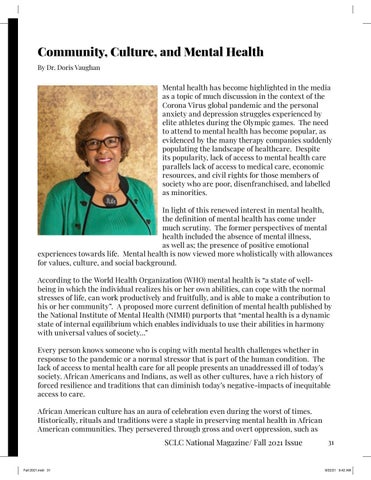Community, Culture, and Mental Health By Dr. Doris Vaughan
Mental health has become highlighted in the media as a topic of much discussion in the context of the Corona Virus global pandemic and the personal anxiety and depression struggles experienced by elite athletes during the Olympic games. The need to attend to mental health has become popular, as evidenced by the many therapy companies suddenly populating the landscape of healthcare. Despite its popularity, lack of access to mental health care parallels lack of access to medical care, economic resources, and civil rights for those members of society who are poor, disenfranchised, and labelled as minorities. In light of this renewed interest in mental health, the definition of mental health has come under much scrutiny. The former perspectives of mental health included the absence of mental illness, as well as; the presence of positive emotional experiences towards life. Mental health is now viewed more wholistically with allowances for values, culture, and social background. According to the World Health Organization (WHO) mental health is “a state of wellbeing in which the individual realizes his or her own abilities, can cope with the normal stresses of life, can work productively and fruitfully, and is able to make a contribution to his or her community”. A proposed more current definition of mental health published by the National Institute of Mental Health (NIMH) purports that “mental health is a dynamic state of internal equilibrium which enables individuals to use their abilities in harmony with universal values of society…” Every person knows someone who is coping with mental health challenges whether in response to the pandemic or a normal stressor that is part of the human condition. The lack of access to mental health care for all people presents an unaddressed ill of today’s society. African Americans and Indians, as well as other cultures, have a rich history of forced resilience and traditions that can diminish today’s negative-impacts of inequitable access to care. African American culture has an aura of celebration even during the worst of times. Historically, rituals and traditions were a staple in preserving mental health in African American communities. They persevered through gross and overt oppression, such as
SCLC National Magazine/ Fall 2021 Issue
Fall 2021.indd 31
31
9/22/21 9:42 AM









